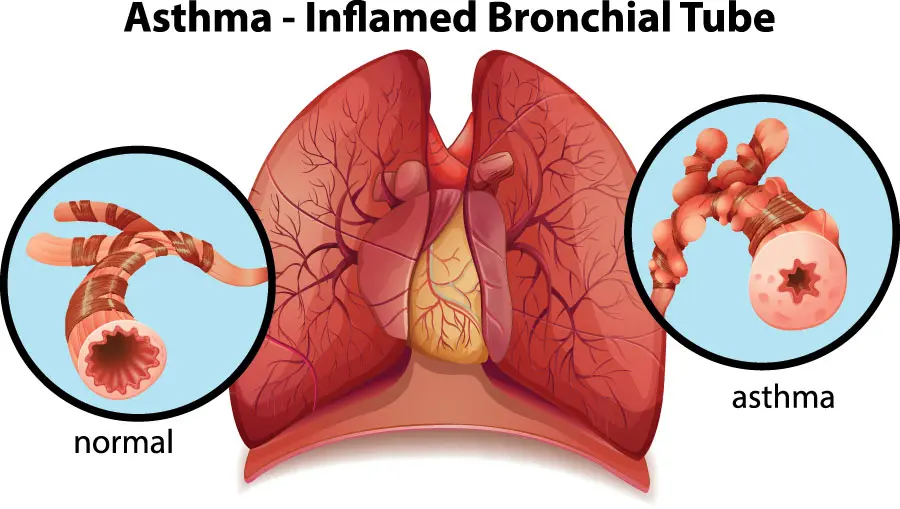


Asthma, a chronic respiratory condition characterized by inflammation and narrowing of the airways, affects millions of people worldwide. It can range from mild to severe and can significantly impact an individual’s quality of life. One question that often arises is whether asthma qualifies as a disability. In this article, we will delve into the legal and practical aspects surrounding the question: Is asthma a disability?

Before addressing the specific question, it’s crucial to understand what constitutes a disability. The definition can vary between legal, medical, and social contexts. From a legal standpoint, the term “disability” is often defined by laws such as the Americans with Disabilities Act (ADA) in the United States. The ADA defines a disability as a physical or mental impairment that substantially limits one or more major life activities.
Asthma varies greatly in severity and how it affects individuals. Some people with asthma experience occasional symptoms and can manage their condition with minimal disruption to daily life. Others, however, face frequent attacks, severe symptoms, and even hospitalizations. It’s important to note that not all individuals with asthma consider themselves disabled, and many are able to lead active lives with appropriate management.
Whether asthma qualifies as a disability largely depends on the impact it has on an individual’s ability to perform major life activities. Breathing is considered a major life activity, and asthma directly affects this function. However, the legal threshold for a condition to be considered a disability involves whether the impairment “substantially limits” the individual.
For some individuals with severe asthma, the limitations on breathing and physical exertion can indeed be substantial. This might lead them to qualify for legal protections and accommodations under laws like the ADA. These accommodations could include workplace adjustments, educational support, and accessibility considerations.
Over the years, there have been legal cases involving individuals with asthma seeking accommodations or protection under disability laws. Some cases have been straightforward, with clear documentation of the individual’s severe asthma and its impact on daily life. In other instances, the question of whether asthma qualified as a disability became a focal point of the legal battle. Courts have had to weigh medical evidence, expert opinions, and the specific circumstances of each case to make determinations.
Asthma exists in a gray area when it comes to disability classification. The variability in its severity and the differing ways it affects individuals can make it challenging to establish a one-size-fits-all answer. Ultimately, the determination often comes down to the individual’s ability to demonstrate how their asthma substantially limits their major life activities.
Asthma can significantly impact an individual’s ability to work, depending on the severity of their condition and the nature of their job. Jobs that require physical exertion or exposure to certain environmental triggers, such as allergens or pollutants, might be particularly challenging for individuals with asthma. In such cases, asthma could be considered a disability if it substantially limits the person’s ability to perform their job duties.
Employers are often required by law to provide reasonable accommodations to employees with disabilities. For individuals with asthma, this could include providing a clean and well-ventilated workspace, allowing for flexible work hours to accommodate medical appointments or recovery periods after asthma attacks, and making modifications to job tasks that trigger asthma symptoms.
In the realm of education, asthma can impact a student’s ability to fully participate in classroom activities. For children with severe asthma, attending school regularly might be a challenge due to the risk of exposure to triggers or the need for medical interventions. This can potentially affect their academic progress and social interactions.
Under laws like the Individuals with Disabilities Education Act (IDEA) in the United States, students with disabilities, including asthma, are entitled to receive special education services and accommodations to ensure they have equal access to education. Schools may need to make arrangements for medical interventions, provide additional breaks, or offer alternative assignments to accommodate students with asthma.
Asthma can have a significant impact on an individual’s mental and emotional well-being. Constant worry about triggering an asthma attack or feeling limited by the condition’s constraints can lead to anxiety and even depression. These emotional challenges are important to consider when discussing whether asthma qualifies as a disability.
From a legal perspective, the ADA recognizes that mental impairments, including those caused by chronic physical conditions like asthma, can also be disabilities if they substantially limit a major life activity. This acknowledges the interconnectedness of physical and mental health and the holistic impact they have on an individual’s life.
Asthma is a dynamic condition that can change over time. Some individuals may experience periods of relative stability, while others might have frequent exacerbations. This changing nature of the condition adds complexity to the question of whether asthma is a disability.
Individuals who experience intermittent symptoms might not consider themselves disabled during periods of remission. However, during severe asthma attacks or flare-ups, their ability to perform major life activities could be substantially limited, leading to a temporary disability status.
Advancements in medical treatment have transformed the management of asthma. Many individuals can now control their symptoms effectively through medications, inhalers, and lifestyle adjustments. These advancements have allowed numerous individuals to lead productive lives without significant limitations.
However, the availability of treatment does not necessarily negate the potential for asthma to be considered a disability. Some individuals might still experience persistent symptoms despite medical treatment, which could meet the legal criteria for disability.
Incorporating these additional points further emphasizes the complexity of determining whether asthma qualifies as a disability. The impact of asthma on employment, education, mental health, and the changing nature of the condition all contribute to the nuanced understanding of disability. Ultimately, the question of whether asthma is a disability requires a comprehensive assessment of the individual’s specific circumstances, the severity of their condition, and the extent to which it limits their major life activities.